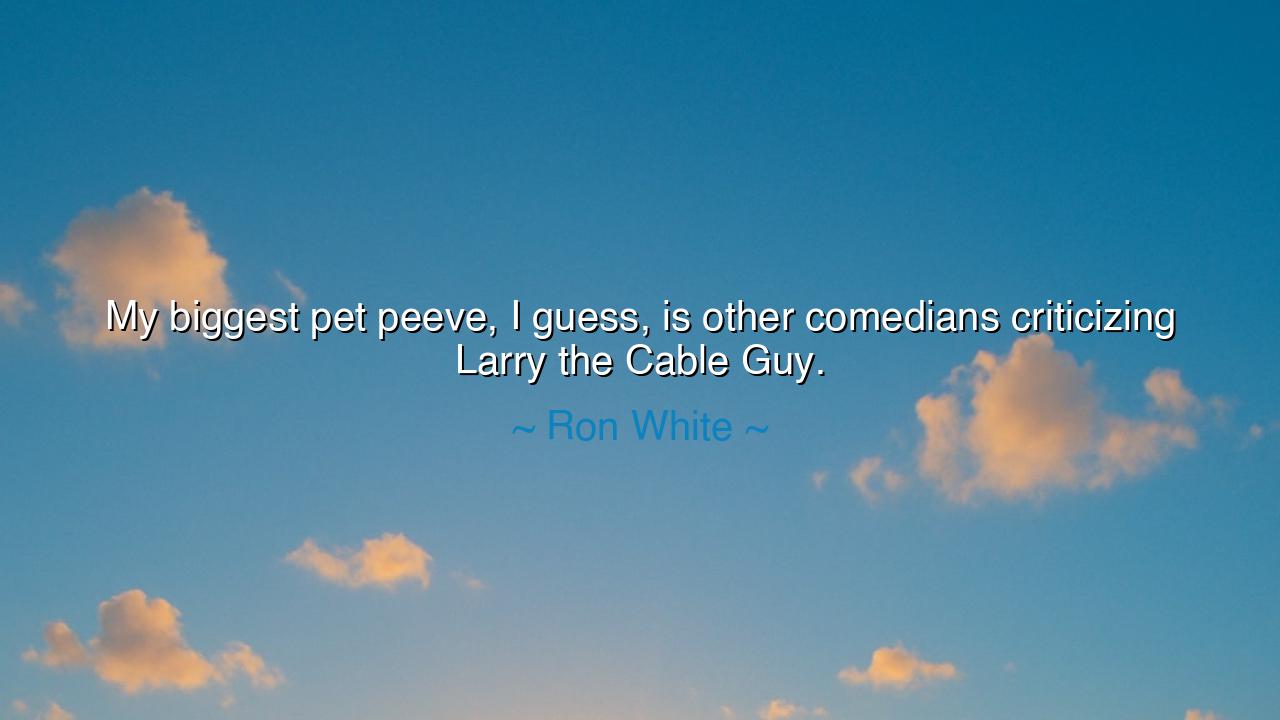
My biggest pet peeve, I guess, is other comedians criticizing






Hear, O seeker of wisdom, the words of Ron White, who proclaimed: “My biggest pet peeve, I guess, is other comedians criticizing Larry the Cable Guy.” Though spoken with the drawl of humor, this saying bears a truth that has endured since the ancients: envy and scorn are the shadows cast upon those who achieve success. What White laments is not merely criticism, but the bitterness of peers who, instead of creating their own fire, attempt to smother the flame of another.
For the calling of a comedian is a noble one: to ease the burden of life through laughter, to expose folly through wit, and to remind the weary that even suffering may be endured with a smile. Yet when those who share the same path turn their weapons upon each other, they forget their greater duty. White’s pet peeve is born of loyalty and justice: that a man who has brought joy to millions, such as Larry the Cable Guy, should not be diminished by jealousy disguised as critique.
The ancients knew this truth well. Aristophanes, the great comic poet of Athens, was scorned by some of his rivals, for his plays drew crowds larger than theirs. Yet time has remembered Aristophanes, while the names of his detractors are dust. Likewise, in Rome, Plautus was mocked for appealing to the common people with broad humor, yet his comedies endured through centuries while his critics vanished into obscurity. So too does Ron White remind us that the measure of a performer lies not in the opinion of peers, but in the joy they bring to the people.
Consider also the story of Shakespeare. In his own time, he was dismissed by certain playwrights as low-born and too willing to cater to the tastes of common audiences. Yet while those voices mocked, Shakespeare’s words grew immortal, for he spoke to the soul of all mankind. His critics wielded scorn as their weapon, but it was his laughter, his tragedies, his plays that endured. Just so, White defends Larry the Cable Guy, for he knows that the laughter of the multitudes speaks louder than the sneers of rivals.
O listener, take this teaching into your heart: envy is the most corrosive of poisons, and it often masquerades as sophistication. To belittle another’s craft is easy; to create joy that reaches millions is hard. Criticism may come, but the wise do not dwell in the marketplace of mockery. They labor in their own field, tilling their soil, producing their fruit, and leaving the judgments of others to the winds.
Practical wisdom follows: when you see another succeed, resist the urge to diminish them. Instead, ask what you might learn from their path, what strength or skill they reveal that you can cultivate in yourself. Let your energy be turned not toward tearing down but toward building up—yourself, your craft, and those around you. For the world has never lacked critics, but it always hungers for creators.
Thus I say to you: heed the counsel of Ron White. Do not waste your spirit in criticizing those who walk beside you on the road of creation. Celebrate their victories, for they prove that the work is possible. Honor their audiences, for they too are part of humanity’s great chorus. And above all, remember: it is not the scorn of rivals that endures, but the laughter, the joy, and the light brought into the world.






AAdministratorAdministrator
Welcome, honored guests. Please leave a comment, we will respond soon